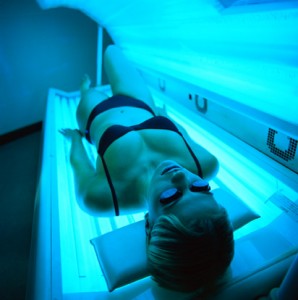 For nearly 100 years, Americans have valued tanned skin as a symbol of health and vitality. (Before 1920, Americans and Europeans considered pale skin and indicator of health and success.) The trend began when doctors began to prescribe sunbathing for ailments, including tuberculosis. Soon Hollywood stars and fashion icons started to boast of tanned skin, and the rest of America followed suit.
For nearly 100 years, Americans have valued tanned skin as a symbol of health and vitality. (Before 1920, Americans and Europeans considered pale skin and indicator of health and success.) The trend began when doctors began to prescribe sunbathing for ailments, including tuberculosis. Soon Hollywood stars and fashion icons started to boast of tanned skin, and the rest of America followed suit.
Today we know that tanning actually significantly increases your risks of developing skin cancer. But thousands of Americans still seek out the warm glow of a tan. And many of them using indoor tanning salons, which offer beds that emit ultraviolet radiation to produce a cosmetic tan.
Yet the evidence clearly shows that indoor tanning significantly increases the risk of developing basal and squamous cell skin cancer, and these risks increase for people who use indoor tanning beds early in life. One systematic review, which included 12 separate studies and more than 9,000 patients with skin cancer, found that indoor tanning contributes to more than 170,000 cases of non-melanoma skin cancer. While neither of these cancers is typically life-threatening, treatment often leads to disfigurement and required reconstructive surgery.
So last year, a group of health organizations — Society of Behavioral Medicine, the American Academy of Dermatology and the American Academy of Pediatrics — called for a ban on indoor tanning for youth under age 18.
In its position statement, the Society of Behavioral Medicine also pointed to evidence about the addictive nature of tanning. Systematic reviews have found that indoor tanning can create a behavioral addiction as a result of the body’s psychological response to ultraviolet light.
To date, nine U.S. states have banned indoor tanning for minors, and more are likely to follow suit as pressure from grows from the medical community. The take-home message on this one is clear: Indoor tanning is bad for your skin, and especially harmful to children and teen-agers.



Speak Your Mind